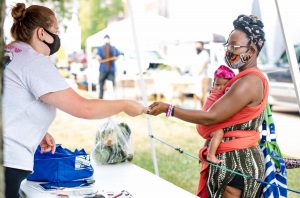 The Food Trust’s Food Bucks program, in partnership with Just Harvest and the Greater Pittsburgh Community Food Bank, gives shoppers $2 in food bucks coupons for every $5 spent in food stamps. Launched in 2010, and originally only available in Philadelphia, this healthy food incentive program has expanded to a statewide initiative, with a focus on the Pittsburgh region and western Pennsylvania. The Food Bucks program is offered in over 50 retail settings, including farmers markets, mobile markets, corner stores and supermarkets.
The Food Trust’s Food Bucks program, in partnership with Just Harvest and the Greater Pittsburgh Community Food Bank, gives shoppers $2 in food bucks coupons for every $5 spent in food stamps. Launched in 2010, and originally only available in Philadelphia, this healthy food incentive program has expanded to a statewide initiative, with a focus on the Pittsburgh region and western Pennsylvania. The Food Bucks program is offered in over 50 retail settings, including farmers markets, mobile markets, corner stores and supermarkets.
The Food Bucks program allows Supplemental Nutrition Assistance Program (SNAP), commonly referred to as food stamps, benefit holders to stretch their budgets to include fresh, healthy, and local fruits and vegetables.
Visit The Food Trust to explore a map to see where, when and how you can earn Food Bucks to purchase fruits and vegetables, and watch the video below to learn more about the Food Bucks program.
Farmers markets, corner stores, supermarkets or other retailers serving SNAP-eligible populations can apply to distribute Food Bucks by contacting Emily Schmidlapp at eschmidlapp@thefoodtrust.org or 215-575-0444, ext. 5178.






 The Allegheny County Health Department announced today that it is has received an additional $1,500,000 two-year grant from the Richard King Mellon Foundation to continue its Live Well Allegheny efforts to enhance food access by eliminating food deserts and by expanding opportunities for physical activity through built environment changes. While Live Well Allegheny targets the entire County, this grant provides resources for a special emphasis on disadvantaged communities and builds on the success of a prior one-year grant.
The Allegheny County Health Department announced today that it is has received an additional $1,500,000 two-year grant from the Richard King Mellon Foundation to continue its Live Well Allegheny efforts to enhance food access by eliminating food deserts and by expanding opportunities for physical activity through built environment changes. While Live Well Allegheny targets the entire County, this grant provides resources for a special emphasis on disadvantaged communities and builds on the success of a prior one-year grant. The First of it’s kind in the region, the groundbreaking AGH Northside Partnership Agreement provided a context in which a mutually beneficial relationship could grow between Allegheny General Hospital (AGH) and Pittsburgh’s Northside community, establishing a framework for a series of initiatives and common goals for housing; education and employment; economic development; and health of the communities.
The First of it’s kind in the region, the groundbreaking AGH Northside Partnership Agreement provided a context in which a mutually beneficial relationship could grow between Allegheny General Hospital (AGH) and Pittsburgh’s Northside community, establishing a framework for a series of initiatives and common goals for housing; education and employment; economic development; and health of the communities. The Highmark Foundation is a charitable organization, a private foundation and an affiliate of Highmark Inc. that supports initiatives and programs aimed at improving community health. As a thought leader in public health and human service initiatives, the Foundation’s greatest success is uniting regional, national and global organizations with like missions to raise awareness and stimulate long-term and systemic change.
The Highmark Foundation is a charitable organization, a private foundation and an affiliate of Highmark Inc. that supports initiatives and programs aimed at improving community health. As a thought leader in public health and human service initiatives, the Foundation’s greatest success is uniting regional, national and global organizations with like missions to raise awareness and stimulate long-term and systemic change. To make Pittsburgh one of America’s most walkable cities.
To make Pittsburgh one of America’s most walkable cities. Pittsburgh Public Schools offers a wide variety of educational options and offerings for our diverse student body. We aim to provide options that not only match our students’ passions and unique needs, but also help to prepare them for the real word through diverse experiences.
Pittsburgh Public Schools offers a wide variety of educational options and offerings for our diverse student body. We aim to provide options that not only match our students’ passions and unique needs, but also help to prepare them for the real word through diverse experiences.
 Today, the Y engages more than 10,000 neighborhoods across the U.S. As the nation’s leading nonprofit committed to helping people and communities to learn, grow and thrive, our contributions are both far-reaching and intimate—from influencing our nation’s culture during times of profound social change to the individual support we provide an adult learning to read.
Today, the Y engages more than 10,000 neighborhoods across the U.S. As the nation’s leading nonprofit committed to helping people and communities to learn, grow and thrive, our contributions are both far-reaching and intimate—from influencing our nation’s culture during times of profound social change to the individual support we provide an adult learning to read.